How to Prep Your HVAC System for Summer Vacation
The car is loaded up with suitcases, the kids are strapped in and you’re ready to embark on your summer vacation. You have all the ingredients for a great trip, but is your home’s HVAC system prepared to sit unattended while you’re gone? Check out this helpful HVAC checklist before you head out.
Turn the thermostat up about 10 degrees, but don’t turn it completely off. Humidity can build up in your home with no cool air or air circulation, leading to problems like mold and mildew. Keep your system running occasionally while you’re away to prevent these issues.
Install a programmable smart thermostat, if possible. This is ideal if you plan to take a longer vacation. With a programmable or smart thermostat, you can set it to start cooling your home to your desired temperature just before your arrival.
Install surge protectors for your HVAC system. If you live in a climate where summer storms are common, surge protectors can safeguard your system against dangerous lightning strikes that cause power surges that damage your electronics while you’re away.
Open all vents. Make sure all rooms of the house have open vents for good air circulation. You may also want to open all doors to keep air flowing through your home.
Check air filters and change if needed. Before going on vacation, check your HVAC system’s air filter. In the summer, dirt and debris can build up faster; you may find yourself needing to change the filter more often. A clogged air filter can cause problems you don’t want to come home to, including increased energy bills and frozen condenser coils.
Latch and lock all windows and doors, and check for cracks and leaks. While you want good airflow indoors, you don’t want hot outdoor air coming in. If you suspect a leak coming from a window seal or under a door, remedy the leak before leaving for your trip.
Close all curtains and blinds. Keeping blinds shut and curtains pulled can lower the indoor temperature of your home. If you have open windows with no covering, consider installing a light sheet while you’re gone.
Inspect the exterior AC unit. Check your exterior unit to make sure it’s clear of leaves, dirt and debris that may be restricting airflow. Examine the inside and outside of the unit and clean as needed.
Check the weather. Checking your local weather before leaving for vacation can help you better prepare your home. Whether the weather is hot and muggy or dry and mild, it’ll affect how you set your thermostat.
Make sure your HVAC system is clean and well-maintained. Do an overall checkup on your HVAC system to be sure it’s in good working order. Schedule an HVAC inspection to make sure your system is running efficiently.
Before you head out for summer vacation, call the heating and cooling professionals at Cox Heating and Air today to schedule your annual HVAC system inspection.
Tips for Getting HVAC Systems Ready to Beat Summer Heat
Memorial Day is the official kick-off for summer and the perfect time for HVAC installation or an upgrade. It’s also a prime time to schedule a tune-up on your existing HVAC system to keep everything running smoothly for the season ahead. Whether you’re planning a laid-back gathering or an epic barbecue bash, make sure your guests are cool and comfortable while they’re inside with our tips on getting HVAC systems ready for a warm Florida summer.
Replace the Filters
Before you start using your HVAC system, replace the filters. Then, make sure you clean or replace them monthly during air-conditioning season. Dirty filters typically cause a unit to work too hard, freeze up and break down. Keeping your filters clean and replacing them regularly lets air flow more freely — your HVAC system will work better and can even remove more pollutants from the air.
Inspect the Inside Equipment
Take a quick look at the ductwork, vents, thermostats and drain lines. It’s better to see if you need repairs before the summer heat hits.
- Ductwork: This is particularly important if your HVAC installation was completed several years ago, but it’s a good idea to get into the routine of checking your ductwork every year no matter how old your system is. Worn-out ductwork can leave HVAC systems vulnerable to inefficient cooling. Check for any loose components, musty odors or spots with damaged insulation.
- Vents: Make sure the vents are free from things that might block airflow, like furniture that needs repositioning.
- Thermostats: Does your home have an outdated thermostat? Upgrading to modern, programmable thermostats can help you save money on energy bills. The U.S. Department of Energy recommends keeping your thermostat programmed for warmer temperatures while you’re away and cooler temperatures right before you return home to save up to 10 percent on your summer cooling bills.
- Drain Lines: Find the indoor cooling coil — there should be a drain nearby. Flush one cup of bleach down the air conditioning drain, and rinse it with a gallon of fresh water. This keeps the drain line clear for the season.
Inspect the Outdoor Equipment
Once you’re sure the indoor parts are in good shape, check the outdoor condenser unit to ensure it’s free of blockages. Examine the electrical wiring and refrigerant lines for heavy wear that might necessitate professional servicing before you turn the system on.
Test the HVAC System
Before having a houseful of people over on a hot day, it’s important to ensure HVAC systems are working well. Turn yours on for a short time to ensure it’s cooling effectively. If it isn’t working at peak performance, you have time to schedule a tune-up before the holiday.
Before you start making Memorial Day plans, see to it that your HVAC system is in tip-top shape. From simple maintenance to complete HVAC installation, Cox Heating & Air Conditioning has all your HVAC needs covered. Visit our website to learn more or schedule an appointment.
Prepping for the summer months? Is your HVAC system ready?
Now is the time to check your HVAC system and HVAC installation, not when summer has already arrived. While most areas in Florida don’t deal with harsh winters, they do experience strong storms, lots of moisture, and varying temperatures, which affect the efficiency of HVAC systems.
While some tasks should be handled by a professional, there are some cleaning and maintenance steps you can take to ensure your HVAC system is ready to handle the heat of the impending summer months.
A general assessment
A basic inspection of the major components of your HVAC system can help you prep for the summer months.
Most A/C units are comprised of two main parts: the condenser unit outdoors and the evaporator unit on the furnace indoors. The two work together to remove warm air and pump cool air through your home. While there are many moving parts to an HVAC system, most of the visible components can be maintained at home. If you suspect serious issues, contact a professional in HVAC installation.
Indoor checklist
The indoor components of HVAC systems are essential to pushing cool air through a home. A quick inspection can help prevent issues.
- Air filter: Change at least twice a year or when needed
- Supply vents and return grilles: Make sure these are open and free of debris; clean as needed
- Condensate line: Look for any drainage issues
- Coolant lines: Look for frayed and missing parts; replace or install foam insulation sleeves
- Overall system function: Turn your system on to make sure cool air blows from the registers; test thermostat
Outdoor checklist
The outdoor condenser unit can be subjected to quite a bit of wear and tear. Take the time to do a quick inspection of your outdoor unit and clear debris from the unit to ensure your HVAC system works at top efficiency.
- Fan: Vacuum out or brush away debris from the blower’s fan blades
- Outdoor panels: If you see missing or misaligned panels, call a professional since these panels enclose the electrical connection
- Condenser coil: Remove sides and top panels of unit; use a soft brush or vacuum to clean coils of debris
- AC Pipe insulation: Replace insulation if you see damage
When to call a professional
Along with seasonal maintenance, there are some preventive steps you can take like using a protective cover on your outdoor unit, but if your system won’t turn on, or if there are issues with the duct system or electrical parts, it’s time to contact a professional.
The experts at Cox Heating and Air Conditioning are available 24/7, so if you’re HVAC system needs repair in the dead of summer, you have a team of professionals at the ready to restore and improve your system’s functioning. The service professionals are specialists in HVAC repairs, HVAC maintenance, and HVAC installation, and are ready to address any and all of your cooling needs this summer.
Green HVAC Systems: Why You May Want a More Efficient and Environmentally Friendly HVAC System
Did you know that your HVAC system drains more energy dollars than any other system in your home? Considering that the average American household spends at least $2,000 a year on energy bills, according to the U.S. Department of Energy, there’s a lot of room for potential savings when you perform energy-conscious upgrades like green HVAC installation. Here are a few reasons why you may want to make the switch to a more efficient and environmentally friendly HVAC system.
Better for the Environment
Exchanging traditional HVAC systems for Energy Star qualified heating and cooling units can have a positive effect on environment. They use significantly less power than conventional systems, which translates to a reduction in greenhouse gas emissions. Energy Star certified HVAC systems and equipment must meet strict specifications set by the Environmental Protection Agency to ensure that they reduce environmental impact.
Save Money
HVAC installation of a high-performing system can result in hundreds of dollars in savings per year. If you choose an Energy Star certified system, you not only save 445 kWh per year of energy and 685 pounds per year in CO2 emissions, you also enjoy up to $717 in lifetime savings for an average product lifespan of 14 years, according to The Home Depot. By installing a greener, more efficient HVAC system, you may also be eligible for local tax credits, rebates or energy efficiency financing.
Safer, More Comfortable Home
Efficient HVAC systems should be felt and not heard. Typically, a noisy system indicates a lack of return airflow, meaning it has to work harder to pull more air through the ducts. An efficient system should run quietly. If there are rooms in your home that are consistently too hot or too cold or have humidity problems, then these are signs of an inefficient system. If you’re unsure whether or not your system needs replacement, the EPA offers a Home Energy “Yardstick” to compare your household’s energy use to others across the country.
A quality HVAC system can also mean a safer home with improved indoor air quality as a result of better humidity control and more efficient air ventilation and purification.
Customize for Best Performance
High humidity can result in condensation damage and poor air quality. Energy efficient HVAC systems often allow homeowners to set the humidity level for a customized approach to comfort. Look for a Seasonal Energy Efficiency Ratio (SEER) score of 13 to 17. SEER measures the cooling output of the system during a typical season divided by the total electric energy input during the same season, telling you how much energy is used to cool the home during warmer months. Most modern systems also work with a programmable thermostat, which can help homeowners save about $180 every year in energy costs, according to the EPA.
If your HVAC unit is old or inefficient, then it’s time to consider replacing it with an improved system. Cox Heating & Air Conditioning has a team of professionals that can handle your HVAC installation as well as help you repair or maintain the life of your existing system.
New Homeowners: What to Look for When Shopping for a Home’s HVAC System
You’ve done it — you’re the proud owner of your very own home! If you’re like most new homeowners, then you’ve probably taken features like the cabinet finishes, countertop materials and plumbing fixtures into consideration during the buying process. But how much do you know about your new home’s hidden costs like heating, ventilation and air conditioning (HVAC) systems? Renters rarely have to deal with HVAC systems, but they’re a major concern for homeowners.
Are you ready to replace or upgrade your HVAC system? We rounded up four pro tips to help make everything from shopping for HVAC systems to HVAC installation less confusing.
1. Know the Basics
Before you start shopping for HVAC systems, it’s helpful to know what you’re shopping for, especially since this is arguably one of the most important systems in your home. Most HVAC installation includes:
- Air Conditioning: The outdoor condensing unit cools the refrigerant, and the indoor component provides the cool air.
- Heat Pumps: These heat and cool your home by cooling warm air during the refrigeration cycle and warming cool air in cold weather.
- Thermostat: Think of this as command central. It lets you switch between heating and cooling, adjust the temperature or turn the system off.
- Ductwork: Cooled air travels from the central air conditioning unit to each room in the house through these pathways.
2. Consider Cooling Efficiency
If you want to save money on your monthly utility bills during the cooling season, the efficiency rating is crucial. The efficiency of the air conditioning component measures in SEER (Seasonal Energy Efficiency Ratio). In 2015, guidelines set 14-SEER as the minimum for most regions of the U.S.
3. Choose Local HVAC Installation Professionals
This may seem like a no brainer, but no one knows what you need better than pros who live in your area. In addition to having the knowledge and expertise about the products, they can also help guide you to choose the best system for your climate. For example, if humidity is a factor, then choosing an HVAC system with a built-in dehumidifier may be a good option.
From buying your first HVAC unit to keeping up with routine maintenance, Cox Heating & Air Conditioning has your HVAC needs covered. Call today at 727-442-6158 or visit coxair.com to learn more about our exacting standards and commitment to providing the best customer service to homeowners across the Tampa area.
Tips for Hiring the Right HVAC Contractor
When it comes to your HVAC equipment, it pays off in the long run to establish a long-term working relationship with a contractor you can trust. Within just a visit or two, a good HVAC contractor will develop a large knowledgebase of information about your specific heating and air conditioning equipment. When you have a professional overseeing the maintenance and repairs, you can rest assured your HVAC system will remain in great condition over the years. Use the five following steps to identify your ideal contractor.
HVAC Terminology Guide
At Cox Air, we know that it can be confusing dealing with technical terms. Why is there a heat exchanger in an air conditioner? What’s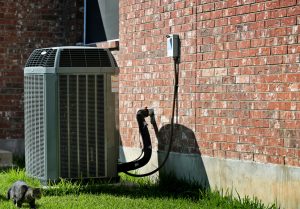
Commercial HVAC Services
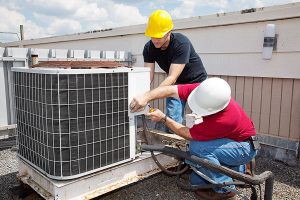
If you’re considering having a new commercial HVAC system installed or need to have your current heating and cooling system repaired, it’s important that you work with qualified HVAC professionals. Installing and maintaining devices in a commercial space takes special expertise. Working with highly trained technicians will help to ensure that you get the longest operating life possible from your HVAC system.
HVAC Installation
Installing a new HVAC system in a commercial space can be a big job. If you need to have a refrigeration system installed, you’ll need to make sure that you have adequate space and that all necessary plumbing is in place. We are happy to install any of the following in your business:
- Central Heating and Cooling Systems
- Ductless Heating and Cooling Systems
- Heat Pumps, Furnaces and AC Units
- Air Purifiers, Humidifiers and Dehumidifiers
- Refrigeration Systems
HVAC Maintenance
Regular maintenance helps to ensure that your HVAC equipment works efficiently. Maintenance can also prevent costly breakdowns that will interrupt the daily flow of business. While you may be able to take care of some servicing tasks on your own, you should also have a licensed technician inspect your equipment and perform maintenance tasks. The following will be completed during a maintenance appointment:
- All equipment, wiring and refrigerant lines will be inspected.
- Condensers, cooling coils and other system components will be cleaned.
- Blowers, blower motors and fans will be cleaned and lubricated.
- Air filters will be cleaned or replaced.
- Refrigerants and fluids will be replenished as necessary.
Remember to follow the manufacturer’s recommended maintenance schedule for the best results.
HVAC Repair
Even with the best care, your HVAC equipment may display symptoms of age or wear. If you are in need of repair services for your commercial HVAC equipment, remember to choose professionals who specialize in handling the needs of business owners. Never attempt to do complicated repair tasks or handle refrigerant.
Working with Commercial HVAC Specialists
At Cox Heating & Air Conditioning, we are proud to provide comprehensive commercial HVAC services to business owners throughout the Clearwater, Florida area. Whether you need a new system installed or are looking for a trusted technician to complete maintenance, we’re here to serve you. Contact us today!
Clean the HVAC System: Hire a Pro vs. Do It Yourself | Cox Air
When you’re working to maintain your heating, ventilation and air conditioning (HVAC) system, cleaning is an issue that regularly comes up. Does your system really need it? Do you have to hire a professional to do the job? Let’s take a look at why it’s important and how to decide whether it’s a do-it-yourself job or if hiring a professional is better suited for the job.
HVAC Terminology You Should Know
When you’re having someone work on your heating, ventilating and air conditioning (HVAC) unit, it can seem like they’re speaking a different language. New terms, acronyms or concepts that you’re not familiar with can leave you more confused than when you started having your system replaced or repaired. Here are some common terms used in the HVAC industry that will help you understand what’s happening with your unit as well as be able to effectively communicate with your trained professionals.












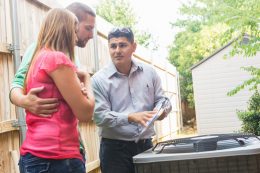
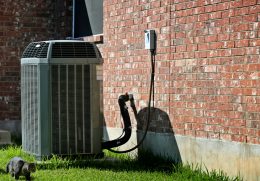

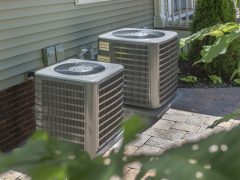
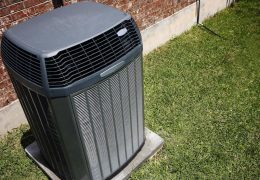

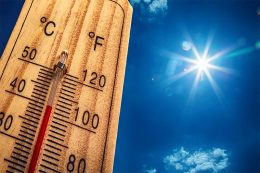


Recent Comments